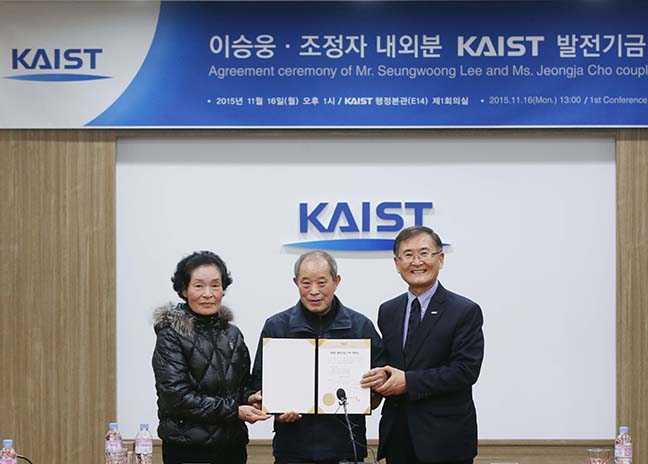fund
“We’ve made a real effort to save our money, but can’t spend it all just on ourselves. Please use it to foster talented students in the field of science, who will enrich our country,” said donors at the donation ceremony held today on campus.
A married couple in their 70s donated their real estate, worth approximately USD 6.41 million, to KAIST on November 16, 2015. Seung-Woong Lee, the husband, and Jeong-Ja Cho, his wife, turned over three properties, including buildings in Seoul and Uijeongbu, to the university.
The couple made a promise to themselves to return their assets back to the Korean society since the beginning of their marriage life. They decided that KAIST was the institution with the most potential to contribute to Korea’s growth. This spring they took that step.
The Lee couple said, “We strove to be frugal to gather such a sum of money. We engaged in all sorts of jobs after we left for Seoul from the countryside when the nation was impoverished.”
Mr. Lee said, “On one snowy winter day, I was riding a bicycle on my way back home. Then I saw a restaurant and, at that moment, I yearned for a bowl of soup in such cold weather. But I just rode past because the whole family could eat with the money that I would spend for the soup.”
Ms. Cho said, “At the beginning, I was rather unhappy with my husband’s very frugal personality. But as time passed, I noticed I had become just like him.” She added, smiling, “I often wandered around the market to get even the smallest discounts, and the shops sometimes refused to sell me the goods.”
Their assets are the result of that work ethic and humility. The couple said, “Today is definitely the happiest day of our life because we would keep our promise. We hope that KAIST will foster outstanding talents in the field of science and technology, students who will advance our nation in the future.”
President Steve Kang of KAIST said, “I would like to express my most sincere gratitude toward to this generous couple who have donated their lifetime assets so willingly to KAIST. Their invaluable support will surely become our springboard to continuously pursue our excellence in science and technology.”
In the picture from left to right are Ms. Jeong-Ja Cho (wife), Mr. Seung-Woong Lee (husband), and President Steve Kang.

-
research Simultaneous Analysis of 21 Chemical Reactions... AI to Transform New Drug Development
< Photo 1. (From left) Professor Hyunwoo Kim and students Donghun Kim and Gyeongseon Choi in the Integrated M.S./Ph.D. program of the Department of Chemistry > Thalidomide, a drug once used to alleviate morning sickness in pregnant women, exhibits distinct properties due to its optical isomers* in the body: one isomer has a sedative effect, while the other causes severe side effects like birth defects. As this example illustrates, precise organic synthesis techniques, which selectivel
2025-06-16 -
event KAIST Holds a Ceremony to Declare their Renewed Commitment for Ethical Management
KAIST held a ceremony to declare their renewed "Commitment for Ethical Management" to raise awareness and solidify the commitment its members to faithfully fulfill ethical responsibilities and duties. Last March, the university established the 'Special Committee for Ethical Management,' chaired by the Provost, and under the leadership of this committee, a new 'Code of Ethics' and 'Code of Conduct' were prepared, containing ethical standards that members must adhere to across all areas of educ
2025-06-16 -
research “One Experiment Is All It Takes”: KAIST Team Revolutionizes Drug Interaction Testing, Replacing 60,000 Studies
A groundbreaking new method developed by researchers at KAIST and Chungnam National University could drastically streamline drug interaction testing — replacing dozens of traditional experiments with just one. The research, led by Professor Jae Kyoung Kim of KAIST Department of Mathematical Sciences & IBS Biomedical Mathematics Group and Professor Sang Kyum Kim of Chungnam National University's College of Pharmacy, introduces a novel analysis technique called 50-BOA, published in Natu
2025-06-16 -
research High-Resolution Spectrometer that Fits into Smartphones Developed by KAIST Researchers
- Professor Mooseok Jang's research team at the Department of Bio and Brain Engineering develops an ultra-compact, high-resolution spectrometer using 'double-layer disordered metasurfaces' that generate unique random patterns depending on light's color. - Unlike conventional dispersion-based spectrometers that were difficult to apply to portable devices, this new concept spectrometer technology achieves 1nm-level high resolution in a device smaller than 1cm, comparable in size to a fingernail
2025-06-13 -
research KAIST Predicts Diseases by Early Detection of Aging Signals in Liver Tissue
- KAIST-KRIBB Develops ‘FiNi-seq’ Technology to Capture Characteristics of Fibrotic Microenvironments Accumulated in Liver Tissue and Dynamic Changes of Early Aging Cells - Elucidation of the Spatial Ecosystem of Aged Liver Tissue, where Reprogramming of Senescent Cells and Immune Exhaustion Progresses, at the Single-Cell Genome and Epigenome Levels < (From left) Professor Jong-Eun Park of KAIST Graduate School of Medical Science and Engineering (GSMSE), Dr. Chuna Kim of K
2025-06-12